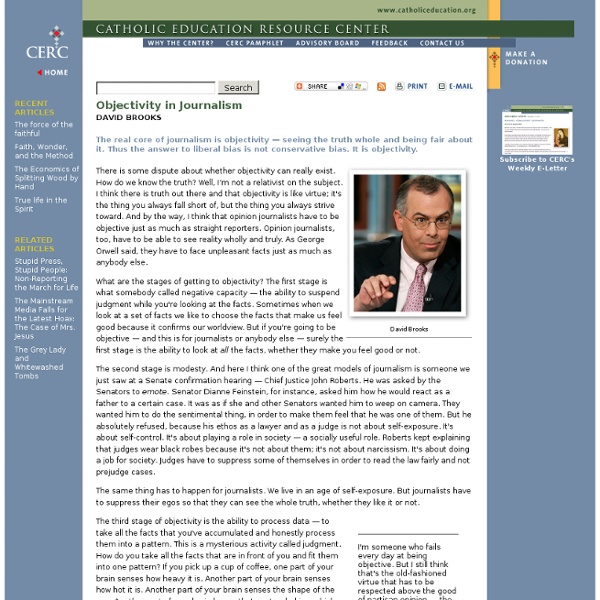Objectivity (journalism)
Journalistic objectivity is a significant principle of journalistic professionalism. Journalistic objectivity can refer to fairness, disinterestedness, factuality, and nonpartisanship, but most often encompasses all of these qualities. Definitions[edit]
Martha Raddatz and the faux objectivity of journalists
Numerous commentators (including me) were complimentary of the performance of Martha Raddatz as the moderator of Wednesday night's vice-presidential debate. She was assertive, asked mostly substantive questions, and covered substantial ground in 90 minutes. That's all true enough, but the questions she asked reveal something significant about American journalism in general and especially its pretense of objectivity. For establishment journalists like Raddatz, "objectivity" is the holy grail. In their minds, it is what distinguishes "real reporters" from mere "opinionists" and, worse, partisans. As they tell it, this objectivity means they traffic only in straight facts, unvarnished by ideology or agenda.
The Myth of Objectivity in Journalism
by This page has been accessed since 29 May 1996. The oft-stated and highly desired goal of modern journalism is objectivity, the detached and unprejudiced gathering and dissemination of news and information.
Rethinking Journalism Ethics, Objectivity in the Age of Social Media
In response to the rapidly changing media environment, many schools and academic programs are offering novel approaches to journalism education. This seismic change creates tensions within programs, especially when it comes to how to teach ethics for this increasingly mixed media. In an earlier column, I put forward some principles for teaching ethics amid this media revolution. But these principles do not address some specific problems. Whither objectivity? Today, students don’t just learn how to report straight news on deadline.
Rethinking Objective Journalism
July 8, 2003 | Like this article? Join our email list: Stay up to date with the latest headlines via email. In his Mar. 6 press conference, in which he laid out his reasons for the coming war, President Bush mentioned al Qaeda or the attacks of Sept. 11 fourteen times in fifty-two minutes. No one challenged him on it, despite the fact that the CIA had questioned the Iraq-al Qaeda connection, and that there has never been solid evidence marshaled to support the idea that Iraq was involved in the attacks of 9/11.
Bob Schieffer, Ron Paul and journalistic "objectivity" - Glenn Greenwald
CBS News‘s Bob Schieffer is the classic American establishment TV journalist: unfailingly deferential to the politically powerful personalities who parade before him, and religiously devoted to what he considers his own “objectivity,” which ostensibly requires that he never let his personal opinions affect or be revealed by his journalism. Watch how thoroughly and even proudly he dispenses with both of those traits when interviewing Ron Paul last Sunday on Face the Nation regarding Paul’s foreign policy views. You actually believe 9/11 was America’s fault?
Questioning Journalistic Objectivity
Journalism, as we've known it, has been mourned deeply over the last few years. The Internet has changed everything. "Citizen journalism," a phrase that still inspires dirty looks at most journalism conferences, has blurred the lines between objectivity and subjectivity, paid and unpaid labor, news and opinion. It gives veteran journalists agita to imagine totally untrained people messing around in their exclusive, albeit hardscrabble, club.
Juan Williams firing: Does journalism need more objectivity
Remember when journalists like Jayson Blair and Stephen Glass were fired for lying? Now, in the wake of Juan Williams's firing from NPR, it seems like the bigger risk journalists take is when they tell the truth – at least about their own feelings. Skip to next paragraph Recent posts Subscribe Today to the Monitor Click Here for your FREE 30 DAYS ofThe Christian Science MonitorWeekly Digital Edition
Principles of Journalism
The first three years of the Project’s work involved listening and talking with journalists and others around the country about what defines the work. What emerged out of those conversations are the following nine core principles of journalism: 1. Journalism’s first obligation is to the truth
Media
Media / Political Bias There is no such thing as an objective point of view. No matter how much we may try to ignore it, human communication always takes place in a context, through a medium, and among individuals and groups who are situated historically, politically, economically, and socially. This state of affairs is neither bad nor good. It simply is.
Objectivity in Journalism
Lack of objectivity in journalism threatens the very worthiness of the profession. Objectivity on the part of reporters, editors, publishers, and news directors go a long way to restore public trust and confidence in the profession. H. A. Myrick defined objectivity "As the expressing, or dealing with facts or conditions as perceived without distortion by personal feelings, prejudices, or interpretations".
7 Principles of Media Objectivity
Media manipulation is one of the most unfortunate aspects of the Israeli-Palestinian conflict. We’ve seen papers blur the distinction between journalism and advocacy, fact-checking failures become fatal, photographers and Palestinians twist reality in mutually beneficial relationships, semantics become politicized and news executives cover up news to protect access. We’ve even seen journalists abuse readers who dared to disagree. None of this is in the public’s interest. News services capable of skewing Mideast coverage are just as capable of botching other areas of coverage.
A Surge on One Channel, a Tight Race on Another
Senator ’s surge in the polls was so strong he was competitive in Mr. McCain’s home state, Arizona. The everyman hero of Mr.
Interviews - Can Journalists Be Truly Objective?
Commentator; former adviser to President Nixon Patrick Buchanan I'm talking about conservative commentators. But sure they do.



